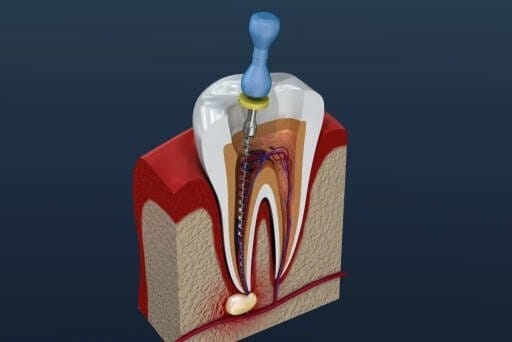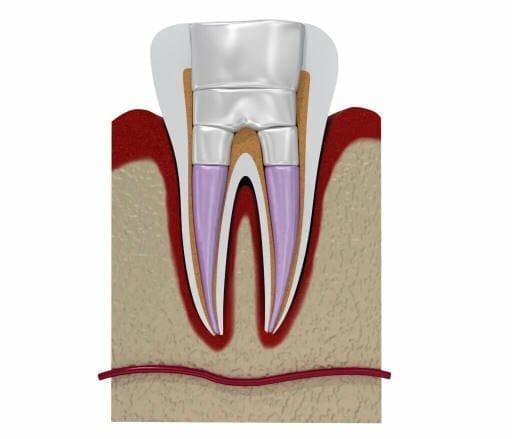Are you looking for root canal treatment in Kitchener-Waterloo?
During a root canal treatment, your Dentist removes the nerve or dental pulp from inside your tooth. Root canal treatments or "root canals" solve a number of problems including:
In popular culture root canal treatments are often stigmatized as an uncomfortable or even painful procedure however, this is not accurate. In fact, the completion of a root canal treatment often relieves intense pain and brings comfort to the patient. Much of the information provided by movies, television, etc., causes patients to experience anxiety about their upcoming root canal treatment.
If you are experiencing anxiety in advance of your root canal treatment, please let us know as we can arrange for you to receive dental sedation during your procedure. Why not have your treatment completed comfortably and without anxiety?
Please refer to our Dental Sedation page for more information about sedation options.

Book a consult to discuss Root Canal Treatment with Dr. Kyle Hornby now. Please call us at (519)-576-8160 Or Schedule Your Appointment Online.
During your appointment, we completely numb your tooth with a surgical grade, high strength, local anesthetic. This anesthetic solution (or dental freezing) is twice as strong as the anesthetic we use for dental filling procedures.

Once your tooth is completely numb, we'll use some small pieces of equipment to keep it dry and free from contamination by your saliva. Access for treatment is made through a small hole on the biting surface of the tooth. The soft tissue dental pulp (including nerve and blood supply networks) is then removed. This allows us to remove all bacteria and contaminants from inside of your tooth root(s).
Once we've adequately cleaned your root canals, we'll fill them with a biocompatible rubber sealant. This sealant prevents any leakage into the cleaned canals. We'll finish off by placing a white filling over the entry point on the chewing surface of your tooth.

Following treatment, it's important to avoid eating hard foods as this can cause damage to your tooth. Root canal treatment increases brittleness and reduces fracture toughness of teeth. For this reason, a post-treatment crown or "cap" is recommended to protect your tooth from a catastrophic fracture.
We will typically follow up after root canal treatment to make sure healing is proceeding smoothly.
If you have been taking an antibiotic to treat an active dental infection, you'll be best off taking that medication to completion.
When your Kitchener Dentist performs a root canal treatment, it's usually to rid your tooth of harmful bacteria causing infection and pain. These infections can cause rapid bone loss around th tooth root. This means that your tooth loses support and becomes more loose with time.
For this reason, earlier intervention can minimize bone loss before your tooth becomes too loose to salvage. It's also harder to eliminate a dental infection when there has been significant bone loss around your tooth.
But, can the infection around one tooth affect other teeth?
Yes. If your dental abscess is left to progress and expand, it can cause bone loss that begins to involve neighbouring teeth.
Now, you're left with multiple teeth needing treatment.
So, even when a dental infection and bone loss may not be causing pain, it's important to seek treatment. Early treatment can maximize the chance of a successful long term outcome.
In some cases, your Dentist will recommend root canal treatment and crown placement for a cracked tooth. In these cases, delaying treatment can result in further cracking and deterioration of your tooth.
Overall, timely treatment can dramatically increase the chance of long-term success.
Root Canal Treatment, like any other Dental or Medical procedure, comes with associated risks. These risks should be disclosed to you by your Family Dentist as part of a proper informed consent discussion prior to treatment.
When Root Canal Treatment is thorough there is little post-operative risk to the patient. The main post-operative risk would be soreness.
Contrary to some recent pop-science documentaries, Root Canal Treatments have never been scientifically linked to cancer and other systemic illnesses.
Yes. Root canal treatment removes nerve tissue and blood supply to your tooth to resolve infection and eliminate pain. Once this is complete, there is no longer "living" tissue inside your tooth.
Despite this, the periodontal ligament (PDL) that surrounds the outer surface of your tooth root(s) remains intact following treatment. This PDL contains millions of nerve fibres and so chewing on a root canal treated tooth will feel no different compared to a non-treated tooth.
The amount of time your Dentist takes to perform root canal treatment depends on the tooth and the number of roots (and therefore canals) it has.
A front tooth (incisor or canine) has a single root. Root canal treatment on these teeth can take 30 - 60 minutes.
A premolar tooth can have 1 (lower premolars) or 2 (upper premolar) roots. For upper premolars with 2 roots the treatment will typically take 45 - 80 minutes.
Molars have 3 or 4 canals. To perform root canal treatment on these teeth usually takes about 1.5 - 2 hours.
Root canal treatments can remove infected tissue from the canal space inside your tooth to resolve infection. In some cases, the infection may be more severe including swelling and drainage of pus. In these instances, your Kitchener Dentist may recommend initial treatment to clear bacteria and establish drainage and then follow up with a separate appointment to assess healing and complete treatment.
Generally, your Family Dentist can treat a straight forward case involving no infection or mild infection/abscess in a single appointment. However, in cases of more severe infection they may recommend a 2-stage approach.
Typically, the 2-stage treatment costs the same amount as a 1-stage approach.
Recovery Time & After Care
During recovery from a root canal treatment, patients may feel totally normal or they may experience a throbbing ache or pressure sensitivity in the treated tooth. The sensitivity commonly subsides within 2-3 days. In cases of more severe pre-treatment infection, it may take 1-2 weeks before the treated tooth feels normal again. We typically advise our patients to test the treated tooth each day with light pressure. If post-operative discomfort exists, chew away from the treated tooth, revisiting it daily to assess for healing. If you grind and/or clench your teeth, make sure to wear your protective nightguard to minimize the likelihood of cracking or fracturing the treated tooth. It is important that patients not chew hard foods on their root-canal-treated tooth until it is reinforced with a crown.
Does Root Canal Treatment weaken my tooth?
Root canal treatment will result in removal of the dental pulp (containing your tooth's nerve) and this makes your tooth more brittle. So, while this has no effect on the strength of your tooth enamel and dentin, it can leave your tooth more susceptible to cracks and fractures.
Sometimes, a fracture can be repaired with a dental filling or dental crown. In the case of a catastrophic fracture, your tooth would be unrepairable and require dental extraction.
So, what can be done to protect your tooth after root canal treatment?
Will My Tooth Turn Black After a Root Canal Treatment?
While it is possible for a tooth to discolour after treatment, it rarely occurs. The discolouration is caused by disruption of the blood vessels within your tooth during treatment. This small amount of blood can oxidize over time and stain your tooth purple, grey or black.
Discolouration is very rare and thoroughly cleaning the inside of your tooth during treatment will ensure removal of all dental pulp and residual blood.
Tooth whitening can typically reverse any staining that occurs post-treatment.
Root canal treatment costs are based on the number of canals in your tooth. Some teeth have more than 1 root and, sometimes, a root has more than 1 canal. Here's a general rule for the number of canals in each type of tooth:
Front teeth/Incisors/Canines/Lower Premolars. These teeth will have a single canal in most cases. In the 2021 Ontario Dental Association Fee Guide, a 1-canal root canal treatment is $562.
Upper Premolars. Upper premolars have 2 canals. A 2-canal Root Canal Treatment costs about $700.
Molars. Upper and lower molar teeth (these are the big ones at the back of the mouth!), will typically have either 3 or 4 canals. A 3-canal Root Canal Treatment costs about $950. 4-canals? You're looking at just under $1,100.
It's important to remember that some root canal treatment cases are more complex and time-consuming in cases where there are super-long roots or when canals are curved. These special circumstances are listed in the Ontario Dental Association Fee Guide and may result in a final fee that is 10 - 20% more.
Ask your Dentist for a cost estimate or pre-determination for treatment costs in advance of your treatment appointment. This will help you to avoid surprises.
Protecting Your Tooth After Treatment With a Dental Crown

After root canal treatment, it is recommended to have a crown or “cap” placed to protect your treated tooth. Treatment eliminates nerve problems and related pain and dental abscesses when present. However, the treatment results in your tooth being more brittle and fracture-prone.
The most common reason for failure of a root canal treated tooth is leakage due to cracking in the absence of a crown. These teeth can also split and require extraction. For this reason, it is important to protect and reinforce your root-canal-treated tooth with a gold, metal, or porcelain crown.
Root canal re-treatment is necessary when a previously root-canal-treated tooth experiences a relapse in pain (most commonly due to abscess or infection). This is most commonly necessary in teeth where the canals were not fully cleaned or filled during the initial treatment. Typically, re-treatment is completed by and Endodontist or root canal treatment specialist.
Referral to an Endodontist can be arranged by your Family Dentist
The American Academy of Endodontics offers a great resource page on all things "Root Canal Treatment" here.
Schedule an Appointment Now
Service
Routine Dentistry & Tooth Repair
Oral Surgery & Tooth Removal
Prosthetic Dentistry & Tooth Replacement
Protective/Preventive Services
Teeth Whitening

OFFICE HOURS